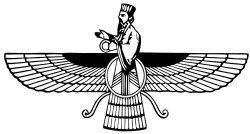Criticism of Zoroastrianism
| This article is of a series on |
| Criticism of religion |
|---|
| Part of a series on |
| Zoroastrianism |
|---|
 |
|
|
Criticism of Zoroastrianism has taken place over many centuries not only from the adherents of other religions but also among
Zoroaster
In the early 19th century, a Christian missionary based in
Literature
The
Wilson argued that the
Polytheism
John Wilson attacked the Zoroastrian reverence of the Amesha Spenta and Yazatas as a form of polytheism, although the Parsis at the time immediately refuted this allegation and insisted that he had in fact addressed the Bundahishn, a text whose relevance to their practice was remote.[10][11] Critics also commonly claim that Zoroastrians are worshipers of other deities and elements of nature, such as of fire—with one prayer, the Litany to the fire (Atesh Niyaesh),[12] stating: "I invite, I perform (the worship) of you, the Fire, O son of Ahura Mazdā together with all fires"—and Mithra.[13] Jean Kellens says that Zoroastrianism as it appears in the ancient Avesta, should be defined as the belief in an unstable polytheism.[14]
Some critics have charged Zoroastrians with being followers of
Intra-Zoroastrian divisions
Zoroastrian reformers, such as Maneckji Nusserwanji Dhalla, have argued that literary precedence should be given to the Gathas, as a source of authority and textual authenticity. They have also deplored and criticized many Zoroastrian rituals (e.g. excessive ceremonialism and focus on purity,[19][20] using bull's urine for ritual cleansing, the attendance of a dog to gaze at the corpse during funerary rites, the exposure of corpses on towers [for consumption by vultures and ravens]")[21][22] and theological and cosmological doctrines as not befitting of the faith.[23] This orthodox versus reformist controversy rages even on the internet.[24]
Divisions and tensions also exist between
Soli Dastur, an member of the North American Mobid Council (NAMC), criticized the belief of the majority of the Zoroastrian community that all parts of the Avesta were written by Zoroaster, describing this belief as false, as evidenced by the difference in the language of writing, and considering the to be the only part of Gathas Zoroaster's writing.[27]
Cyrus Niknam,denies the existence of a bridge and considers the idea to have come from other religions in the Sassanian era and he considers it an invention of the author Book of Arda Viraf[28]
Religious influences on Zoroastrianism
Dr. Ardeshir Khorshedian, the head of the Mobidan Association of Tehran, described the idea of Saoshyant as having been developed by the Zoroastrians and that the idea that Saoshyant is the promised one came from the Jews, but with the Islamic conquest of Persia the idea became more widespread among the Zoroastrians.[29]
Also Cyrus Niknam, a Mobad, writer and researcher of ancient Iranian culture, says that the idea of a savior is a wrong interpretation by the priests of the Sassanian era and that in reality there is no savior but rather a correct interpretation of the word Saoshyant is the useful from the sacred.[30]
Also Cyrus Niknam,denies the existence of a
Who is a Zoroastrian (Zarathushti)?
Much like the question of who is a Jew?, Zoroastrian identity, especially whether it is adopted through birth or belief (or both), "remains a cause for tension" within the community.[32][33] Reformers have criticised the orthodox refusal to accept religious converts as one reason for the communities' declining population.[34]
Predestination
Zoroastrians have been criticized by Muslim authors for their rejection of predestination.[35][36] This follows a famous hadith of Muhammad in which he negatively associates the Qadariyah Islamic sect with the Magians.[37][38]
Patriarchy
Zoroastrianism has been criticized for the perception that it promotes a patriarchal system, expressed through such avenues as an all-male priesthood and its historical allowance of polygamy—practiced by Zoroaster himself.[39][40][41]
References
- ISBN 9788170999621.
- ISBN 9780857719713.
- ISBN 9781118785508.
- ISBN 9780773564381.
- ISBN 9788170999621.
- ISBN 9780857719713.
- ISBN 9780857719713.
- ISBN 9780896938236.
- ISBN 9780857719713.
- ISBN 9780857719713.
- ISBN 9789004131316.
- ISBN 9780198267591.
- ISBN 9789004131316.
- ^ Essays on Zarathustra and Zoroastrianism, Mazda Publishers, Costa Mesa, 2000. pp 35 - 39
- ^ Dhalla, Maneckji Nusservanji (1914). Zoroastrian Theology: From the Earliest Times to the Present Day. p. 337.
- ISBN 9780773564381.
- ISBN 9780857719713.
- ISBN 9780773564381.
- ISBN 9780896938236.
- ISBN 9789004131316.
- ISBN 9780773564381.
- ISBN 9789004131316.
- ISBN 9780857719713.
- ISBN 9789004131316.
- ISBN 9780857719713.
- ISBN 9781134691159.
- ^ "Dhalla: Saga part 2, OBSERVING RELIGIOUS LITERATURE FROM A NEW ANGLE". www.avesta.org. Retrieved 2025-06-04.
- ^ "موبد گرامی اقای نیکنام. پل چینود چگونه است؟ آیا همان پل صراط است. چگونه فرد گناه کار از آن رد می شود؟". www.kniknam.com (in Persian). Retrieved 2025-03-28.
- ^ "سوشیانت یا موعود مزدیسنا دارای چه معنایی است؟ - امرداد". amordadnews.com (in Persian). Retrieved 2025-03-20.
- ^ "زرتشتیان به منجی آخر زمان باور دارند، اگر بپذيريم كه شهربانو نیز يكی از بزرگان زرتشتی است. پس فرزندان او نيز از بزرگان زرتشتی بوده اند، اين فرزندان ازامامان شيعيان هستند، آيا می توان برخی از آنان را سوشيانت دانست؟". www.kniknam.com (in Persian). Retrieved 2025-03-28.
- ^ "موبد گرامی اقای نیکنام. پل چینود چگونه است؟ آیا همان پل صراط است. چگونه فرد گناه کار از آن رد می شود؟". www.kniknam.com (in Persian). Retrieved 2025-03-28.
- ISBN 9780857719713.
- ^ Ariane Sherine (2013). "Zoroastrianism needs to adapt its archaic laws – or die". Guardian News and Media Limited. Retrieved 22 June 2015.
- ^ Laurie Goodstein (2006). "Zoroastrians Keep the Faith, and Keep Dwindling". The New York Times. Retrieved 26 July 2015.
- ISBN 9783111662381.
- ISBN 9781586488130.
- ISBN 9781851681471.
- ISBN 9789004106789.
- ISBN 9780810868588.
- ISBN 9780567088666.
- ISBN 9780773511446.
